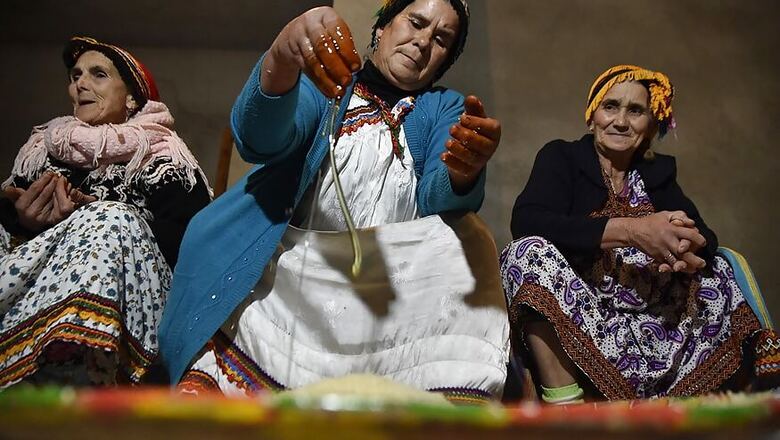
views
Algeria on Friday marked the Berber New Year as a public holiday, a first for the North African region where indigenous peoples have long suffered marginalization. Members of the Berber community -- descendants of North Africa's pre-Arab inhabitants -- feasted on traditional meals of couscous and chicken, danced, played traditional games, and held horse parades as they do each year. But for the first time official events marking the Yennayer celebration were also being held across the entire country of some 40 million people, roughly a quarter of whom are Berber.
"Traditionally we celebrate Yennayer with our families around a copious meal of poultry and dried meat," explained Samia Moumni, as she cooked couscous under a small tent in the town of Tizi-Ouzou. Some 3,000 people were expected to flock to a stadium in the northern town -- centre of the mountainous Berber region of Kabylie -- to enjoy a communal meal later in the day.
The Berbers -- who refer to their community as Amazigh -- have long fought for greater recognition for their ancient language and customs, over-shadowed by Arabic culture in Algeria and across the broader region. The Yennayer New Year has been celebrated annually for a long time in Algeria -- but veteran leader Abdelaziz Bouteflika decreed in December that it would become an official holiday for the first time "to strengthen national unity." The Berber calendar is an agrarian system, based around the seasons and agricultural work, that was inspired by the Julian calendar. It was brought back to life in the second half of the 20th century by activists who set year zero as the estimated ascension of Berber ruler Shoshenq I to the throne of Egypt in 950 BC.
On the eve of year 2968, Berbers in the village of Ath El Kacem braved the freezing cold to tuck into the communal meal prepared all evening by women who chanted songs and traditional poems. "This year, Yennayer has a special flavour," said Na Ouerdia Mohamedi, one of the village's elders. Nearby Kahina Belaidi, 20, insisted that "the decision of President Bouteflika will help strengthen the Amazigh identity of Algeria."
The Berbers' Tamazight language was first given official status in Algeria in 2002 after bloody riots a year before that left 126 people dead in Kabylie, before being enshrined as a state language alongside Arabic in the 2016 constitution. On Wednesday the country's interior ministry released its first ever official communique in Tamazight.




















Comments
0 comment